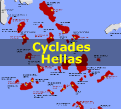After slaying the Minotaur, the Athenian hero Theseus and Ariadne, the Cretan princess who loved him, stopped to rest on Naxos island on their way to Athens. Yet the next morning, while Ariadne was sleeping, Theseus set sail and abandoned her. Various explanations for Theseus ungallant behavior have sprung up over the centuries. Did he simply forget about her, did he find a new mistress, or did the god Dionysus, who later found Ariadne and married her, desired her from the moment she set foot on Naxos, and warn Theseus away? In all events, Ariadne lived happily ever after with Dionysus, who taught the Naxians how to make their excellent wine and set Ariadne's crown, the Corona Borealis, amongst the stars. Like the rest of the Cyclades, the local and original Cycladic civilization developed on Naxos island as early as 3,000 BC. The Mycenaean civilization (1,600-1,200 BC) spread all over Greece and also influenced Naxos. Vases, swords, seals and other findings have been excavated. Sea trade was well established during the 7th century (archaic period). It was renowned for its famous Naxian marble, which was used to make the temples that adorned the major important sanctuaries of the archaic period, such as the sanctuaries of Apollo at Delphi and on Delos. In the middle of the 8th c. BC, the island took part in the colonization movement and in 735/4 BC, in collaboration with Halkis on Evia, founded the Greek colony named Naxos in Sicily, in the foothills of Mount Etna. The island achieved the height of its power and wealth during the time of the tyrant Lydgamis in the second half of the 6th century BC. It was then that the construction of the Archaic Ionic temple of Apollo began. Although the island was devastated by the Persians in 490 BC and never recovered its former glory, the Naxians took part in the battle of Salamis, contributing four ships. When Marco Sanudo came to Naxos in 1207, he first captured the island's chief Byzantine castle, T' Apalirou. When Venice refused to grant Sanudo the independent status he desired, he broke away in 1210 and organized most of the archipelago into a Duchy of Naxos with himself, naturally, as the first Duke. He built a powerful castle in Naxos Town (today’s Venetian Castle in Hora) which was consisting of 7 towers. Only two of the original seven towers (those of Sanudo and Glezos families) remain. The castle today includes a housing complex with the structure of a medieval city, one of the very few preserved in Greece. Venetians’ Catholic descendants still live in the old mansions which encircle the site. In order make his fellows to stay in the island, he burned their ships. Sanoudos divided the island into territories and distributed them among his nobles. He and his successors, although ruling with a heavy hand, continued in power until the Turkish take-over in 1564, when the infamous Barbarossa conquered and plundered the island. Turkish rule was briefly interrupted by the Russians in 1770-1774 and was finally ended by the 1821 war of Independence in which Naxians played a notable part. In 1832 the island was finally united with the rest of Greece. During this present century Naxos has supplied Greece with many worthy men and women in the fields of politics, literature and art, medicine science and sport, and has always provided stalwart allies in all Greece's struggles for independence, freedom and peace.




